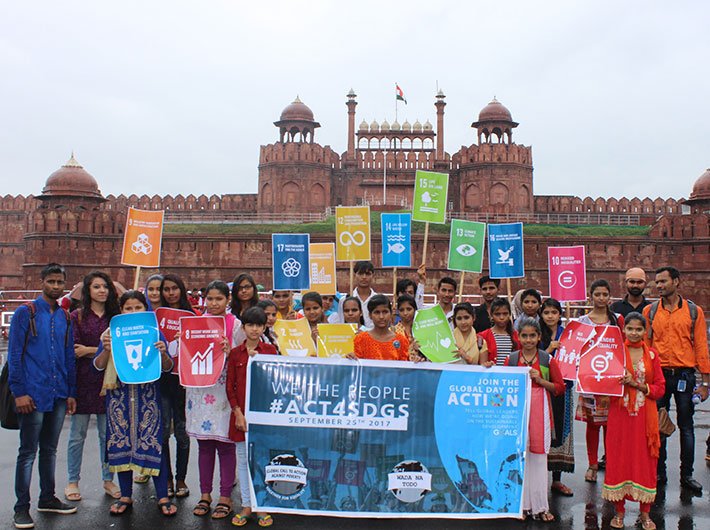Various forms of mass mobilizations were organized by the Global Call to Action Against Poverty (GCAP) and the UN SDG Action Campaign on the second anniversary of SDGs
More than 3 million people across 110 countries, including India, observed the Global Day of Action and asked their governments “what have you done on the SDGs?”
On September 25, 2015 the leaders from 193 countries adopted Agenda 2030” and the Sustainable Development Goals (SDGs), in the UN General Assembly.
Various forms of mass mobilizations were organized by the Global Call to Action Against Poverty (GCAP) and the UN SDG Action Campaign on the second anniversary of SDGs, people took action to spread awareness on sustainable development and climate change and seek accountability from the governments on their international commitments.
“Increasing conflict and inequality, unprecedented levels of migration and displacement, and the devastating effects of climate change are some of the issues that define our age. Extremism and disenfranchisement fuel reactive political movements with chaotic and dangerous outcomes. These are issues, which go beyond country borders, require concerted efforts at regional and global levels,” says Beckie Malay, the chairperson of GCAP.
Actions in Asia
In India, Wada Na Todo Abhiyan, a civil society alliance working on SDGs released its assessment on the progress made on Agenda 2030 in India in 10 states like the Rajasthan and Jharkhand. It undertook photo stunts in front of India Gate, Red Fort, Qutub Minar, Parliament house and other such important places in New Delhi to assert people’s power and demand actions from government to end discrimination against the marginalized communities.
In Japan, the civil society held an interface with the parliamentarians to discuss on sustainable development and handover a charter of demands. In Nepal, the elderly women and men undertook a rally organized by Ageing Nepal, a NGO to demand social security cover to the elderly. The NGO federation of Nepal submitted a memorandum to the
National Planning Commission to expedite implementation of SDGs.
In Philippines, the students in the Polytechnic University of the Philippines were oriented on the SDGs. In Pakistan, mobilisations were done across the country with different stakeholders including women, men, boys, girls, person with disabilities, civil servants, policy makers, researchers, media etc. In Sri Lanka, a SGD walk was carried out in Colombo.
Mobilisation in Africa
In Togo, the civil society along with the youth group discussed the SDGs and the strategies needed to achieve the sustainable goals and significantly reduce inequalities.
In Ghana, the campaign was done in a high school compound where the students helped remind the government to speed up action for the respective goals that matter to them.
In Zimbabwe, public gatherings were held with the youth to discuss on what has been done so far on SDGs. In Malawi, a press conference and a photo shoot session were organized to reach out to Malawian leaders with assorted messages on SDGs and to raise awareness of the public. In Uganda, photo stunts were organized. In Mali, a press conference was organized on SDGs leading to massive coverage in media.
Actions in Latin America
In El Salvador, civil society organized an open forum with the UNDP and the National University to discuss on Agenda 2030. It held a human rights and SDGs fair with more than 600 people participating.
In Argentina, dances and street actions in the middle of Buenos Aires and audiovisual activities were organized.
Every year the High Level Political Forum (HLPF) of the United Nations is held in the month of July to take stock of the progress made on SDGs by the member nations. In 2016 and 2017, 22 and 43 countries respectively presented a voluntary national review (VNR) of their progress on Agenda 2030. Civil society has expressed concerns over the VNR process, which feels that only rosy pictures are presented by the member nations sans the discussion critical gaps and learning.
“Without concerted advocacy and mass pressure, achieving the SDGs will remain a distant dream,” said Malay of GCAP while explaining the circumstances where GCAP felt it necessary to organize the mass actions.
(Baisakh works with GCAP as the Asia Coordinator.)

